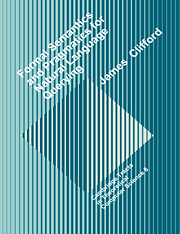7 - Examples from the QE-III Fragment
Published online by Cambridge University Press: 06 October 2009
Summary
Introduction
In this chapter we present and discuss examples of the syntactic and translation rules of the QE-III fragment whose definition was given in Chapter 6. As we pointed out in that presentation, the PTQ fragment stands essentially intact as the core of QE-III. There are, however, certain changes to this core. One major change is our use of the logic ILs as the intermediate translation language; this logic is a modification to Montague's IL, and makes explicit the hidden abstraction over indices that is a part of the evaluation process in Montague's PTQ analysis. In defining ILs we have already shown that we evaluate any expression α with respect to a state s by forming the expression: [λiα](s).
Moreover, in presenting the pragmatics of QE-III, we showed how the pragmatic interpretation of any sentential expression was essentially given by the denotation of the expression formed by λ-abstracting over all of the free individual variables and also evaluating with respect to now.
In addition to this change in the underlying logic and method of evaluation, the following additional modifications have been made to the rules of the PTQ fragment:
Rule S4 has been modified to perform the single function of combining a Term with an IV to form a sort of proto-sentence. It no longer performs the verb inflection for third person singular present tense. The entire treatment of tense and time adverbials is now performed more systematically by rules S101 through S106. (The tensing functions of S17 have therefore been totally eliminated.)
[…]
- Type
- Chapter
- Information
- Formal Semantics and Pragmatics for Natural Language Querying , pp. 133 - 172Publisher: Cambridge University PressPrint publication year: 1990



